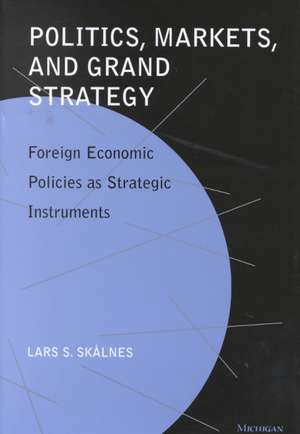Politics, Markets, and Grand Strategy: Foreign Economic Policies as Strategic Instruments
Autor Lars S. Skalnesen Limba Engleză Hardback – 31 iul 2000
Why do states sometimes discriminate in favor of certain states and at other times choose to pursue nondiscriminatory policies? In answering these questions, Lars S. Skålnes stresses the international political importance of foreign economic policy, arguing that trade, foreign investment, and foreign aid policies are strategic instruments great powers use to manage political and military relations with allies and adversaries.
Skålnes explains changes in foreign economic policy in terms of shifting strategic assessments regarding the importance of military support from allies. When states need military support from their allies to meet threats to their security, they will adopt discriminatory foreign economic policies in an attempt to strengthen alliance relations. When states can go it alone without military support, by contrast, they will not pursue foreign economic policies that discriminate in favor of either allies or other countries. Discriminatory policies, Skalnes argues, are important strategic instruments for several reasons. First, they can be used to tie countries to a military alliance. Second, they are useful as signals of intention. Third, discriminatory policies may strengthen an ally militarily by increasing the economic resources available for military purposes.
Skålnes provides detailed accounts of the grand strategies of Germany (1879-1914), France (1887-1914), Great Britain (1919-1939), and the United States (1945-1967).
Politics, Markets, and Grand Strategy will be important reading for scholars and students in the fields of national security studies, international political economy, and economic history, and to economists working on problems associated with foreign investment and trade generally and customs union theory and discriminatory trade agreements specifically.
Lars S. Skålnes is Associate Professor of Political Science, University of Oregon.
Skålnes explains changes in foreign economic policy in terms of shifting strategic assessments regarding the importance of military support from allies. When states need military support from their allies to meet threats to their security, they will adopt discriminatory foreign economic policies in an attempt to strengthen alliance relations. When states can go it alone without military support, by contrast, they will not pursue foreign economic policies that discriminate in favor of either allies or other countries. Discriminatory policies, Skalnes argues, are important strategic instruments for several reasons. First, they can be used to tie countries to a military alliance. Second, they are useful as signals of intention. Third, discriminatory policies may strengthen an ally militarily by increasing the economic resources available for military purposes.
Skålnes provides detailed accounts of the grand strategies of Germany (1879-1914), France (1887-1914), Great Britain (1919-1939), and the United States (1945-1967).
Politics, Markets, and Grand Strategy will be important reading for scholars and students in the fields of national security studies, international political economy, and economic history, and to economists working on problems associated with foreign investment and trade generally and customs union theory and discriminatory trade agreements specifically.
Lars S. Skålnes is Associate Professor of Political Science, University of Oregon.
Preț: 463.10 lei
Preț vechi: 532.30 lei
-13% Nou
Puncte Express: 695
Preț estimativ în valută:
88.62€ • 91.96$ • 74.07£
88.62€ • 91.96$ • 74.07£
Carte indisponibilă temporar
Doresc să fiu notificat când acest titlu va fi disponibil:
Se trimite...
Preluare comenzi: 021 569.72.76
Specificații
ISBN-13: 9780472110315
ISBN-10: 0472110314
Pagini: 272
Ilustrații: 1 drawing, 21 tables
Dimensiuni: 152 x 229 x 30 mm
Greutate: 0.58 kg
Ediția:New.
Editura: UNIVERSITY OF MICHIGAN PRESS
Colecția University of Michigan Press
ISBN-10: 0472110314
Pagini: 272
Ilustrații: 1 drawing, 21 tables
Dimensiuni: 152 x 229 x 30 mm
Greutate: 0.58 kg
Ediția:New.
Editura: UNIVERSITY OF MICHIGAN PRESS
Colecția University of Michigan Press
Notă biografică
Lars S. Skålnes is Associate Professor of Political Science, University of Oregon.
Descriere
Why do great powers sometimes favor one country over another in the conduct of their foreign economic policies?
